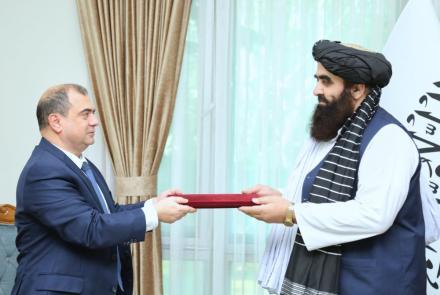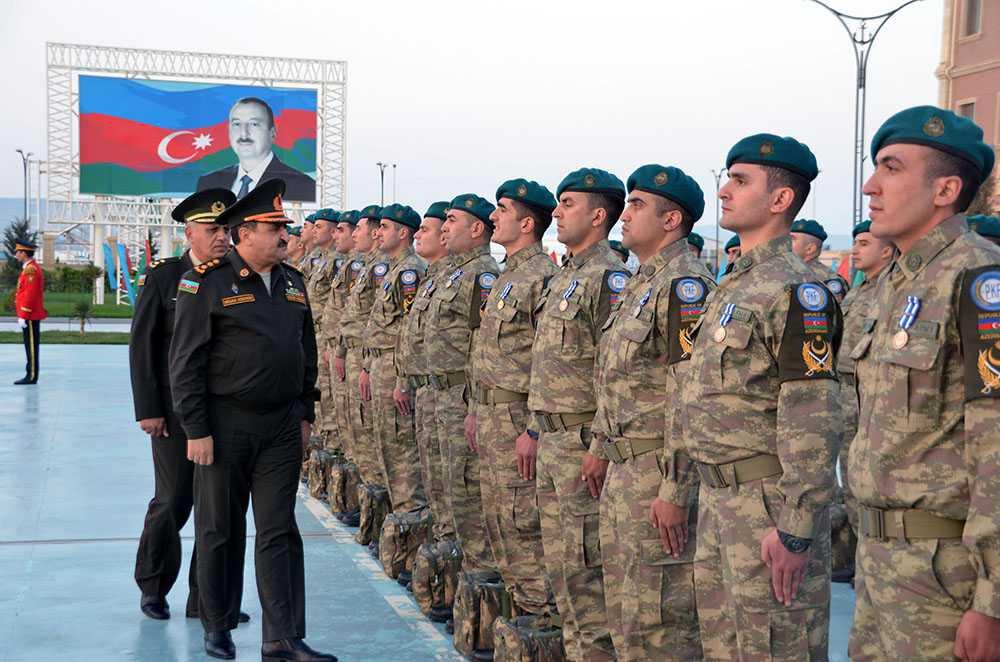Azerbaijan's strategic expansion in Afghanistan A calculated gamble amid uncertainty?
Azerbaijan's recent diplomatic engagement with Afghanistan under the Taliban government has sparked curiosity and raised questions about the motivations behind Baku’s strategic maneuvers. Despite widespread criticism and concerns about the legitimacy and stability of the Taliban regime, Azerbaijan has been actively expanding its ties with Afghanistan, signaling a calculated and determined approach.
Why is Azerbaijan keen on expanding relations with Afghanistan?
Azerbaijan’s interest in Afghanistan is rooted in both geopolitical and economic considerations. Geopolitically, Azerbaijan has always been strategic in its foreign policy, carefully balancing its relationships with major powers while securing its interests in volatile regions. Afghanistan, under Taliban rule, represents both a challenge and an opportunity for Baku.
Economically, Afghanistan is seen as a land of untapped potential, especially in terms of its vast mineral resources. The Taliban’s control over the country, while controversial, has not deterred Azerbaijan from pursuing opportunities to explore and potentially exploit these resources. Baku's approach indicates a recognition that early engagement with the Taliban government could yield significant economic dividends, particularly in sectors like mining, logistics, and energy.
Furthermore, Azerbaijan's involvement in Afghanistan is also a continuation of its previous efforts to establish a foothold in the country. Even before the Taliban took power, Azerbaijan had been investing in Afghanistan, working with previous governments to build economic and political ties. The continuation of these efforts under the new regime suggests a long-term strategy aimed at securing a stable and profitable partnership, regardless of the ruling government.
A pragmatic stance
Azerbaijan's rapprochement with Kabul can be understood through its pragmatic foreign policy approach. Baku has often prioritized its national interests over aligning with international opinion, especially when it comes to securing strategic advantages. By maintaining and expanding relations with Afghanistan, Azerbaijan is positioning itself as a key player in the region, potentially benefiting from economic opportunities that others might overlook due to political or other concerns.

This pragmatism is evident in Azerbaijan’s decision to open an embassy in Kabul in March 2024, a move that many countries have been hesitant to make. The opening of the embassy signifies a commitment to deepening relations with the Taliban government, despite the regime's contentious international standing. Azerbaijani Ambassador Ilham Mahammadov’s comments on the positive relations between Kabul and Baku, and his emphasis on shared values such as independence and territorial integrity, reflect a diplomatic strategy that prioritizes stability and mutual benefit over ideological alignment.
Trilateral meeting: A step towards economic integration
The latest trilateral meeting between Afghanistan, Azerbaijan, and Uzbekistan further underscores Baku's commitment to fostering economic ties with Afghanistan. The meeting focused on enhancing economic and trade relations, developing transport and logistics sectors, and exploring Afghanistan’s mineral resources is a clear indication of the areas where Azerbaijan sees potential growth.
The discussions on conducting geological explorations and implementing a cement production project in northern Afghanistan highlight the specific sectors where Azerbaijan and Uzbekistan are looking to invest. These projects, if successful, could not only boost Afghanistan’s economy but also provide Azerbaijan with lucrative opportunities in the mining and construction industries.
Uzbekistan's involvement in this trilateral meeting is also significant. Like Azerbaijan, Uzbekistan has its own strategic interests in Afghanistan, particularly in terms of securing trade routes and access to resources. The cooperation between Azerbaijan and Uzbekistan in engaging with the Taliban government suggests a coordinated effort to stabilize and integrate Afghanistan into regional economic frameworks, despite the challenges posed by the current regime.
Azerbaijani peacekeepers’ role in Afghanistan
Azerbaijan’s military involvement in Afghanistan, particularly through its peacekeepers, played an important role in understanding Baku's broader strategy. Azerbaijani peacekeepers were part of the International Security Assistance Force (ISAF) and later the Resolute Support Mission, contributing to the security and stability of Afghanistan during the years of allied occupation. When international forces withdrew and Kabul fell to the Taliban, Azerbaijani peacekeepers were among those who remained to ensure the safe evacuation of personnel and maintain order.
This experience has provided Azerbaijan with a unique perspective on Afghanistan's security landscape and has likely informed its current approach to engagement with the Taliban government. The presence of Azerbaijani peacekeepers during critical moments in Afghanistan’s recent history has established a degree of trust and credibility between Baku and Kabul, which is now being leveraged in diplomatic and economic initiatives.

Baku & Tashkent’s active role in Afghanistan: Why now?
The question arises: Why are Baku and Tashkent so eager to be active in Afghanistan at this juncture? The answer lies in a combination of strategic foresight and economic opportunism. Both Azerbaijan and Uzbekistan recognize that Afghanistan, despite its political instability, is a central piece in the broader regional puzzle. As neighboring countries and potential transit hubs, Azerbaijan and Uzbekistan stand to benefit significantly from a stable and economically integrated Afghanistan.
For Azerbaijan, in particular, the North-South Transport Corridor - an ambitious project aimed at connecting South Asia to Northern Europe through Iran, Azerbaijan, and Russia - could see significant benefits from a stable Afghanistan. By engaging with the Taliban government early, Azerbaijan is positioning itself to secure crucial transit routes and economic partnerships that could enhance its role as a key player in regional trade.
Moreover, the potential for Afghanistan to become a major supplier of minerals and hydrocarbons adds another layer of economic interest. Azerbaijan’s focus on conducting geological explorations and exploring high-potential mineral areas in Afghanistan reflects a long-term strategy to tap into these resources, which could further bolster its economic growth.
While the future of the Taliban regime remains uncertain, Azerbaijan and Uzbekistan’s engagement with Afghanistan can be seen as a calculated risk. The potential rewards - access to resources, enhanced trade routes, and strategic partnerships - are significant enough to justify the gamble. Both countries are likely aware of the risks involved, including the possibility of regime collapse or international sanctions, but they are betting on the idea that early investment and engagement could secure their interests in the long run.
For Azerbaijan, this approach aligns with its broader foreign policy principles: maintaining bilateral relations independent of third countries, being consistent and predictable, and ensuring that its territory is not used against its neighbors. By staying true to these principles, Baku can navigate the complex and often volatile political landscape of Afghanistan while securing its own strategic interests.
Conclusion
In conclusion, Azerbaijan’s expanding relations with Afghanistan under the Taliban government represent a strategic gamble with high stakes. Driven by a combination of economic opportunity and geopolitical strategy, Baku is positioning itself as a key player in Afghanistan’s future, despite the regime's untested nature and uncertain outlook.
By engaging early and maintaining a pragmatic stance, Azerbaijan aims to secure its interests in a region that remains crucial to its long-term goals. While the risks are real, the potential rewards of a stable and economically integrated Afghanistan make this a gamble that Baku is willing to take.








